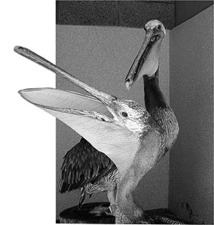The Pelican Lady
May 01, 2001 05:22PM ● By Don Kindred
story and photos by Maggie Zeibak
Panic sets in. Should you dial 911? A life is in danger. This is an emergency but you can't physically perform mouth-to-mouth resuscitation. A group gathers; no one knows what to do, and so, another member of an endangered species dies. Can the death of this brown pelican be avoided? It will be if Heather Goulet has anything to do with it.
California Brown Pelicans are frequently at risk for injury, swallowing hooks or becoming entangled in fishing lines. Years ago, DDT caused reproductive failure and hunters decimated the species prizing their feathers as adornment for ladies' hats. We see these birds at our beaches and sometimes neglect to focus on the fact that they can be lost to us if we don't take care of them. Plastic debris, such as six-pack drink holders carelessly tossed away, can slowly strangle or choke these majestic seabirds. Without medical attention, they will die.
Trained as a volunteer worker for the Pacific Wildlife Project, a registered nonprofit charity, Australian-born Goulet is on-call from the organization to rescue San Clemente pelicans in distress. She uses a cloth rescue method, which ensures the bird's eyes and head are covered and the pelican will remain calm. "It is extremely important", she says, "to hold the bill in one hand and scoop the bird up with the other." Once she has the bird in custody (usually a cardboard box for safe transport) she transfers it to the organization's headquarters in Irvine for medical attention.
Many younger pelicans are inexperienced and tend to consume inappropriate objects or miscalculate dives. In their quest for food they may not always be selective, sometimes gulping up balloons, hooks or lead sinkers. As soon as they lack the ability to dive for their food, injured pelicans ultimately succumb to starvation, if not rescued. Some birds will show injuries in the form of wounds such as a leg or wing dragging and need surgery immediately.

The professional veterinary staff at the PWP Center volunteer, and no salaries are paid for their unselfish work. Hospital expenses and food are funded through the kindness of generous donors and abundant supplies of used towels and newspapers are always welcome.
Heather, and husband Arnold, moved full-time to San Clemente from Los Angeles just last year. "I know that I enjoy working with the pelicans because of the ocean connection we have," she smiles "I love being a small part of helping them back to their wildness especially when we humans are usually the cause of the pelicans needing rehabilitation. It's a unique experience to look into the eyes of something so wild."
Every Tuesday she donates her time to the center, feeding the birds and cleaning their cages. She visually checks each one to ensure that they appear healthy and verifies the information on individual care charts attached to the cages. Frequently, birds come into the facility underweight so it is vitally important to follow the dietary requirements set out by the veterinarians. Donning rubber gloves and ensuring that her arms are covered, she carefully approaches a pelican. "They are very fast," Goulet commented, "and although I was apprehensive at first, I soon learned that I wouldn't break their wings. These birds are much more resilient than you think. When I first held one, I was overawed by the fact that this was not a domestic animal. I had always been known as the cat lady, yet I've been captivated by these magnificent birds."
It was just last year when this diminutive, heart-of-gold lady had her interest piqued. A group of her friends, recognizing Heather's commitment to animal life "shanghaied" her into a visit to the Center, and, of course, she immediately signed up to become a volunteer. Initially she observed other workers and veterinarians during her on-the-job training, now she trains other dedicated people who also selflessly offer their time. Much of her work is basic, but vital to the recuperation and release of the pelicans. Hosing out the cages, "showering" the birds and offering them entrees of oviferous fish are part of the housekeeping duties Goulet performs. She has always been an outdoors person so she doesn't mind getting dirty, especially when the rewards are seeing a rehabilitated bird returned to the wild. Her Outward Bound experience a few years ago helped her focus on the precarious balance nature has with mankind. With that in mind, she looks forward to hearing a "happy sound" cry from the birds, that way she knows they are on the way to recovery.
During the summer months the workload increases as more suffering pelicans are brought into the shelter, some with botulism. At that point the birds share accommodations after release from the Intensive Care Unit, but are observed to make sure they are compatible roommates. The Wildlife Project treats over 2,000 animals each year and most of the volunteers agree with John James Audubon who thought the pelican "one of the most interesting of our American birds". Unquestionably, a close-up look at this sea animal's unique bill which functions as a "dip net" and a cooling mechanism, should prompt us to admire Heather's respect for their survival and man's ability to perform humane acts. To save a pelican is a gratifying experience and she reminds fisherman, surfers and beach goers to call immediately if they see an injured bird.
Giving back to the environment is obviously a humbling pleasure for Heather Goulet, one rehabilitated pelican at a time.
Resources to call include Lifeguards, Rangers, Harbor Patrol and Animal Services or call the Pacific Wildlife Project at 949/831-1178. Volunteers are always appreciated at the Center.



